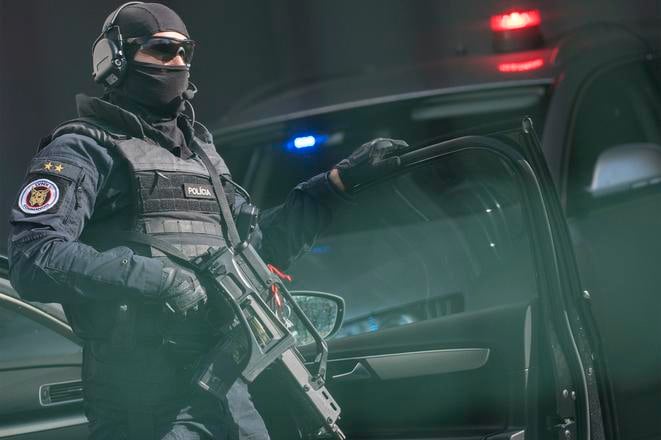Several years ago, I had a discussion with someone on a train in Switzerland about a new British prime minister (I think it must have been Gordon Brown, or possibly David Cameron; certainly, it was back in the days when the holder of that position did not change every six months). Out of politeness, I asked about the prime minister of Switzerland, but it turns out there isn't one: my fellow traveller (who was Swiss) explained that the nearest equivalent is the president of the Swiss Federal Council – but he had no idea who it was at that time.
In boring, stable places people do not know the names of even very senior state officials – they assume that they are doing their jobs, and for the most part they are. It is striking that I can name the leaders of more post-Soviet republics than I can EU member states.
An exception applies in places, like America, where senior judges and even police officers are elected and hence need to attract some sort of public profile.
But, in general, prominence among public officials – especially relatively minor ones – is not a good sign. It is a growing trend in America under the second Trump administration – and also in Slovakia. When it happens, it is normally for one of two reasons.
First, it can mean that such people are wielding far too much clout.
Why is it, for instance, that the general secretary of the Service Office of the Slovak Ministry of Culture, to give him his full and superbly obscure title, is a household name? I am speaking of course of Lukáš Machala, a regular in these pages, who is famed for his conspiracy theorising, for being on close terms with one of Slovakia’s highest profile anti-Semitic extremists, and for his role in the recent disappearance of a national art treasure. (He also plays a significant role in the management of Slovakia’s state broadcaster.)
Alternatively, it can mean that the person in question, through no wish of their own, has become the target of a vilification campaign by other, more powerful people. Anyone who reads the Slovak press, for instance, is expected to know who the “Čurillovci” are.
For those of you fortunate enough to not know, this is a shorthand reference to Ján Čurilla, a police investigator, his fellow detective Pavol Ďurka, and a number of their colleagues who once worked on high-level criminal investigations before 2023 (when the current government came to power).
Čurilla and Ďurka shot to prominence when they were arrested in 2021, during the so-called “war in the police”. Despite being released to continue their work soon afterwards, they were suspended by the current government in one of its first acts and are now being held under what amounts to house-arrest, pending prosecution on charges of abuse of power.
Police officers in any country are occasionally prosecuted, albeit in relative obscurity. But the case of Čurilla and co. has been highly politicised, not least by the current prime minister (the subject of some of their investigations), who has relentlessly portrayed them as a sinister cabal. They and their families have been sucked into national politics against their will, their faces plastered all over the media.
Recently, another senior police investigator has shot to prominence. Matej Varga, the former director for eastern Slovakia of the elite but now-disbanded National Crime Agency (NAKA) to which Čurilla and Ďurka belonged, was detained on July 1 in almost cartoonish style.
A shocking account in the Denník N daily, based on notes taken by Varga himself, records how he was arrested inside his office at Prešov District Police Headquarters by another investigator accompanied by heavily armed SWAT officers.
He is accused of having conducted, in the course of his police work in 2022, a “direct attack on the constitutional order and the proper functioning of the state”. Quite why this grandiose, historical (and apparently flimsy) claim required a commando raid several years later is unclear.
The fact that Varga was released after just a few hours – in the middle of the night, after being deprived of his wallet, phone, driving licence and ID, at a random petrol station several hours’ drive from his home – suggests that the aim was not so much to collect evidence but – as with his former colleagues – to set an example.
Don’t be shy
But his case highlights a converse, and equally troubling, trend: anonymity. Not only were the officers who detained Varga heavily armed, they were masked.
The use of these so-called “kukláči” (“balaclavas”) – i.e. masked paramilitary police officers – dates back to the mafia wars of the 1990s, when police officers and their families faced a real risk of reprisals.
Sometimes they still do; the same principle legitimately applies to terrorist cases (although whether a shackled 72-year-old homegrown alleged “terrorist” really requires Al-Qaeda levels of security is less clear).
But some recent deployments of the kukláči have begun to verge on the ridiculous.


 A member of the elite police force in front of the building of the Specialised Criminal Court on November 7, 2020, in Pezinok. (source: TASR - Martin Baumann)
A member of the elite police force in front of the building of the Specialised Criminal Court on November 7, 2020, in Pezinok. (source: TASR - Martin Baumann)